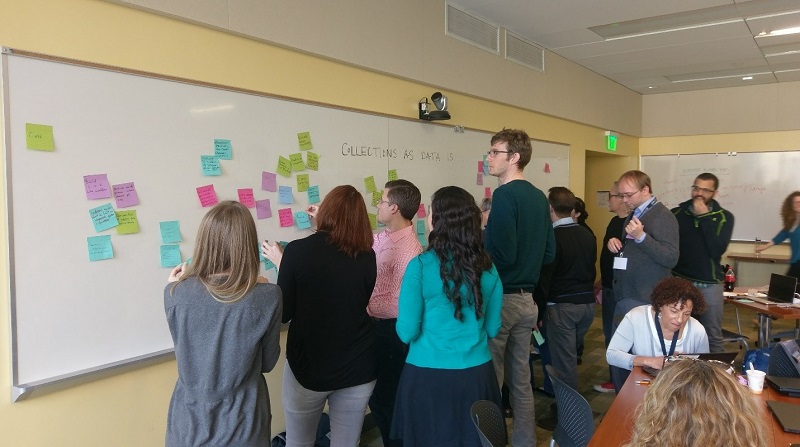Blog Posts | August 2, 2017
Share ThisDr. Ashley E. Sands
Senior Program Officer, Office of Library Services
In April, IMLS announced 39 awards made through the National Leadership Grants for Libraries program (NLG) and the Laura Bush 21st Century Librarian program (LB21). The seven projects highlighted in this post represent a total investment of more than $1,680,000. Click the log number for each grant to access more information, including selected documents from each grant proposal.
The production and dissemination of knowledge have long been central components of library services. Through the national digital platform (NDP) framework, IMLS supports the development of tools and services for serving researchers with digital materials, as well as the staff expertise essential for a rapidly evolving digital world. IMLS awards highlighted in this post illustrate the importance and growing complexity of work related to using and preserving born-digital collections.
Sharing Resources for Accessing and Preserving Born-Digital Content
Shared resources are an important NDP focus. Instead of continuing to develop new and disparate tools and services, through NDP IMLS strives to bring together and strengthen existing resources where appropriate. Four recent awards advance shared library practices for preserving and providing access to born-digital content.
For some library services multiple tools may needed. The Educopia Institute (LG-71-17-0016-17), in partnership with the School of Library Sciences at the University of North Carolina Chapel Hill, received $681,178 to investigate the interoperability of three open source digital library tools for content curation (BitCurator, Archivematica, and ArchivesSpace) and their integration into workflows of 12 partner institutions. This research serves to strengthen open source tools and ensure they can work in a variety of contexts.
For managing some digital content, shared tools do not yet exist. The Frances Loeb Library at the Harvard University Graduate School of Design (LG-73-17-0004-17) is working to preserve born-digital architectural and design records, which were often created with complex proprietary software. They received $89,728 to convene two priority-setting meetings to develop the policies, procedures, and technical expertise necessary to support long-term preservation of these special materials.
Across these projects is an interplay between the development of tools, communities of practice, and education and training for librarians. For example, work to develop tools in software preservation can simultaneously lead to the development of library practice. Having completed one year of IMLS-funded planning (LG-73-15-0133-15), library staff from California Polytechnic State University and the University of Texas at Austin (RE-95-17-0058-17) will train a cohort of archivists, librarians, and curators to develop emulation and software preservation services in their cultural heritage organizations. IMLS funds of $249,686 will supply sandbox tools and expert time to develop the skillsets of a cohort of library staff who will then bring emulation and software preservation services and expertise back to the broader cultural heritage community.
Another award will improve the depth and breadth of data curation expertise among library staff. Building on the Digital POWRR project (LG-05-11-0156-11), Northern Illinois University, with the HBCU Library Alliance and three other institutions, (RE-85-17-0012-17) received $240,423 to hold five two-day institutes enabling librarians and archivists from small and mid-sized institutions to build skills in necessary standards, processes, and tools for curating and preserving digital collections. This program will reach 150 individuals with hands-on training and expert consultation.

Enabling Research Use of In-Copyright, Born-Digital Content
Research communities that traditionally have been far afield from quantitative methods are more frequently pursuing data-intensive research, and library staff must become equipped to serve them. As seen in previous awards, humanities scholars now frequently seek ways to examine collections computationally. For example, a 2016 NDP award to the University of California, Santa Barbara (LG-73-16-0096-16) funded a series of meetings entitled “Always Already Computational” to address the preservation, access, and reuse of collections that support computationally-driven research. However, many existing research collections are held under copyright or the contents are restricted for other reasons. Two new awards to library staff and scholars across the country seek innovative ways to allow access to restricted content for research scholars across disciplines.
Faculty and staff from the University of Illinois at Urbana-Champaign's Library and School of Information Sciences (LG-73-17-0070-17) are beginning with a broad approach to enabling research use of restricted collections. With $99,536 in IMLS funds, they will bring together library, researcher, and content provider stakeholders to discuss and recommend a framework to address how to provide scholars access to protected texts for data mining and other analyses. Indiana University, in partnership with eight other academic libraries (LG-71-17-0094-17), have already prototyped the “data capsule” technique to access the HathiTrust Digital Library while respecting copyright concerns. This $320,546 grant will allow the data capsule method to be advanced and tested with other collections, ideally becoming a technique that can serve as a way to legally access restricted materials in academic libraries across the country.

Dr. Ashley E. Sands is a Senior Program Officer in the Office of Library Services. She manages a portfolio focusing on national digital platform National Leadership Grants and Laura Bush 21st Century Librarian Grants related to opening scholarly communications, including efforts in research data management, open science, and emerging forms of scholarly publishing. Ashley can be reached at asands@imls.gov.
